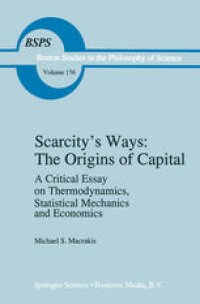
Ebook: Scarcity’s Ways: The Origins of Capital: A Critical Essay on Thermodynamics, Statistical Mechanics and Economics
Author: Michael S. Macrakis (auth.)
- Tags: History, Economic Theory, Physical Chemistry, Philosophy of Biology
- Series: Boston Studies in the Philosophy of Science 176
- Year: 1997
- Publisher: Springer Netherlands
- Edition: 1
- Language: English
- pdf
invoking the fluctuation-dissipation theorems of Einstein and 2 more recently those of Callen and Kubo in order to get to manageable results. In this manner, great strides have been made in the development of the many-body problem without reaching the necessity to legitimize thermodynamics. Ther modynamics and statistical mechanics were used successful ly as bridges and guides to get the new ideas to conform to the macroscopic experiences (measurements). Hence the dis 3 interest of theoreticians. The frustration in attracting the at tention of the working physicists on this problem is vividly described in Carnap's (1978) account on the reception of his ideas and efforts at the Institute of Advanced Studies at Prin ceton where he worked on the Two Essays on Entropy; it al most amounted, he thought, to a conspiracy of silence. The priorities of theoretical physicists remain with the puzzles and the cranking at hand: Quantum Field Theory (QFT) and "creation and annihilation" physics, solid state physics, - to mention only a few research areas - command the attention of those working on the research frontiers. Thermodynamics is taken for granted and is thought to be an almost depleted research area. Whatever the subterfuges, the hand-waving arguments, the paedagogical red herrings, the procedures work and nothing can be gained by allocating intellectual re sources to resolve ambiguities with few, if any, expected rewards. Down deep, all believe that the regularization of the field will one day be accomplished.
This is an exploratory critical essay on the Origins of Capital and the Foundations of Thermodynamics. In economics the existence of capital is taken for granted yet it is difficult to establish for it a robust definition. Capital theory addresses the coupling of the present with the future; as such it does not deal with its own history, evolution or its origins. The concern is the (discounted) future rather than the historical or even prehistorical past; at best, Hesiod's economy in his Works and Days marks the beginning of economic history. Yet, in its generic form, capital is but a physical or biological engine that processes materials and transforms energy in an environment of thermal non-equilibrium. The objective is to show the importance of capital in the comprehension of thermodynamics. I argue that the idea of scarcity as the fountain of history and its concomitant concept of value must be incorporated in the substance of thermodynamics and the meaning of measurement; this necessitates some excursions into the territory of economics with a review of capital theory, of evoluationary biology and the origins of life, and of the received ideas on thermodynamics. To discuss measurement - a long-standing quandary and the quintessential quantum problem - for lack of a better approach a formal hybrid pragmatist's outlook is retained in the form of virtual Cartesian dualism.
Audience: This work will be of interest to historians and philosophers of science and economics, and engineering thermodynamicists.